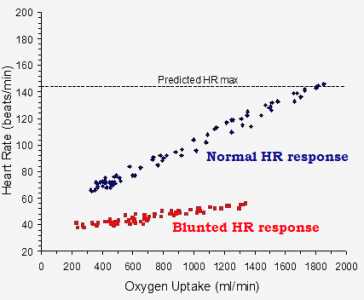The Workwell Foundation issued the press release below about its meta-analysis of 20 years of studies that shows “overwhelming evidence” of chronotropic incompetence in people with ME/CFS, which contributes to activity intolerance in people with myalgic encephalomyelitis (ME).
A normal response to exercise is an increase in heart rate. Failure of the heart to keep pace with an increase in demand is called chronotropic incompetence (CI), a disabling condition that causes activity intolerance and often leads to poor health outcomes. According to a new meta-analysis from researchers at Workwell Foundation and the University of the Pacific, CI is commonly found in people with ME/CFS, a complex neuroimmune disease.
The meta-analysis, published recently in Frontiers in Pediatrics, drew on 20 years of studies involving 1- and 2-day cardiopulmonary exercise testing (CPET). When comparing heart rate data between ME/CFS patients and matched controls, the authors asked if chronotropic incompetence contributes to the activity intolerance that underscores this disease.
They found overwhelming evidence of CI in ME/CFS patients, including both men and women, relative to healthy subjects. In a finding unique to this disease, the study showed that the heart rate response was even lower on the second day of repeat exercise testing at both peak and sub-peak levels, putting the oxygen costs of even simple activities above a safe heart rate threshold for many.
The magnitude of CI also depended on disease severity, with the most severe patients experiencing even greater differences between actual and predicted maximum heart rate.
According to Workwell Foundation, CI can make a bad situation worse. A blunted heart rate in response to exercise could exacerbate the already low oxygen consumption found in this disease and further limit levels of activity. CI further compounds post-exertional malaise (PEM), a worsening of symptoms in response to activity.
The authors hypothesize that an abnormal heart rate response to exercise is likely due to impaired autonomic regulation of the heart. They suggest new research directions that should be explored to better understand what drives the patterns discovered in this paper.
These findings send an important message to health care providers and patients trying to manage their illness through pacing activities. Pacing plans based on age-predicted heart rate thresholds should be viewed with caution because the chronotropic response is impaired in people with ME/CFS.
The full chronotropic incompetence study titled, “Chronotropic incompetence: an overlooked determinant of symptoms and activity limitation in myalgic encephalomyelitis/chronic fatigue syndrome,“ is available online in the open-access journal Frontiers in Pediatrics.
Workwell Foundation a fiscally-sponsored program of United Charitable, a registered 501c3 organization.
[maxbutton id=”17″ url=”https://www.frontiersin.org/articles/10.3389/fped.2019.00082/full” text=”Read the Meta-Analysis” ]* * *
If you would like more information about this topic, or to schedule an interview with Staci Stevens, please contact her at 209.599.7194 or email: info@workwellfoundation.org






 ) and a message about #MillionsMissing with your own networks. Desktop: Download by right clicking on the image or clicking on the download icon in the bottom right corner of the image. Mobile:
) and a message about #MillionsMissing with your own networks. Desktop: Download by right clicking on the image or clicking on the download icon in the bottom right corner of the image. Mobile: